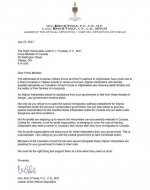Afghan interpreter seeks safety in Canada
“Disappointing” and “unacceptable.”
That’s how federal Conservative leadership candidate Erin O’Toole describes the “terrible” response from Canadian Immigration Minister Ahmed Hussen to an Afghan interpreter’s fear of assassination for serving Canada’s troops.
Karim Amiry, 28, now living in Kabul, Afganistan, served with Quebec’s Bulldog Company of the Royal 22nd Regiment from 2009-11. Taliban insurgents have threatened to kill him and Amiry now wants to come to Canada.
“Afghan Interpreter Karim Amiry feared for his life,” says O’Toole.
The Durham MP — a former veterans affairs minister, a lawyer and a one-time Canadian air force officer — knew what to do.
“I immediately hand delivered a letter to the Minister of Immigration, Refugees and Citizenship and spoke to him about this case.”
It didn’t work.
“Weeks later, I received a truly disappointing response that indicates he does not take the matter as seriously as his predecessor,” said O’Toole.
In his Feb. 1 letter, O’Toole wrote: “Mr. Amiry, as one of the many Afghan interpreters seeking refuge in Canada, has received a threat letter from the Taliban. I now fear that Mr. Amiry’s life is at imminent risk because of his work for Canada.”
Instrumental in encouraging previous immigration minister John McCallum to bring Afghan interpreter James Akam from a refugee camp in Germany a year ago, O’Toole was looking for similar action.
“It is to that end that I request for ministerial Intervention to assist Mr. Amiry and his family,” wrote O’Toole. “The work of interpreters, like Mr. Amiry, in gathering intelligence and building connections to the local population likely saved many Canadian lives in Afghanistan, at great risk to them and their families.”
But he did not get back the response he was expecting.
“Your support for Mr. Mohammad has been noted and I appreciate the circumstances which prompted you to write,” Hussen wrote back 47 days later. “The Government of Canada has acknowledged the contribution certain Afghan nationals made to the Canadian military, during our combat and civilian mission in Kandahar, Afghanistan.”
The minister explained that “certain Afghans who faced extraordinary personal risk as a result of their work in support of Canada’s mission in Kandahar could apply to come to Canada through the Afghan Special Immigration Measures program” which brought in approximately 800 applicants.
“However, the special measures were ended in September 2011, and unfortunately, Mr. Mohammad can no longer be considered for immigration under this program. Mr. Mohammad may wish to review the eligibility requirements for Canada’s other immigration programs, which can be found on our website.”
Thanking O’Toole, the minister ended his letter: “While I regret that my response cannot be more favourable, I hope that you will understand my department’s position on this matter.”
O’Toole does not understand it at all.
“When I approached (former) minister McCallum about James Akam, he got it right away,” said O’Toole. “What I received back from Minister Hussen was an almost standard form letter. I am pretty disappointed. It was a terrible display. Like something coming from a nameless bureaucrat. And this guy is a refugee himself.”
Hussen is a Canadian success story. Having come from war-torn Somalia as a child and growing up to be a lawyer and mentor, the MP is now a cabinet minister. Hopefully Canadians can change his mind and that of Trudeau, who goes to great trouble to bring in anti-Islamophobic Motion-103 but closes the door on Muslim men who fought on our side against Islamic terror.
O’Toole has “great respect” for Hussen which is why he is perplexed.
“I find it unacceptable,” he said “of the current government’s failings on this important issue.”
He figures there are about two dozen verifiable applicants with military files who “are the ones who accidentally got left behind and slipped through the cracks of the program.
“These guys helped our troops” said O’Toole. “These people’s lives are at risk because they helped Canada. That is why there are threats against them.”
Amiry and other interpreters tell me they are still in hiding in an increasingly hostile environment in Afghanistan thanks to the Taliban and ISIS.
O’Toole says the solution is simple.
“We just need a one-time extension to bring over all of the documented interpreters who qualify so we have not left anybody who served with our troops behind,” said O’Toole.
A request for an interview with Hussen was not granted but a government spokesman said that while “humanitarian and compassionate” considerations are made on a “case-by-case basis” there are “no special measures for Afghan interpreters are planned at this time.”
O’Toole says blood that comes from that decision is on the Trudeau government’s hands.











